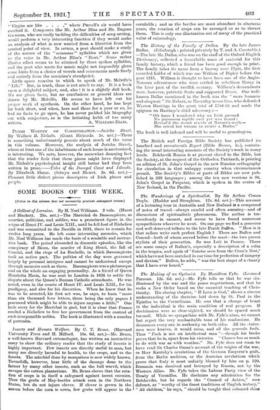Insects and Human Welfare. By C. T. Brum (Harvard University
Press and H. Milford. 10s. 6d. net.)—Mr. Brues, a well-known Harvard entomologist, has written an instructive essay to show the ordinary reader that the study of insects is highly important. Few insects are directly useful to man, but many are directly harmful to health, to the crops, and to the forests. The mischief done by mosquitoes is now widely known. Townsfolk, however, hear little of the damage done to the farmer by many other insects, such as the boll weevil, which ravages the cotton plantations. Mr. Brues shows that the rota- tion of crops is in itself a safeguard against insect enemies. Thus the grubs of May-beetles attack corn in the Northern States, but do not injure clover. If clover is grown in the season before the corn is sown, few grubs will appear in the cornfields ; and as the beetles are most abundant in alternate. years, the rotation of crops can be arranged so as to thwart them. This is only one illustration out of many of the practical value of entomology.


































 Previous page
Previous page